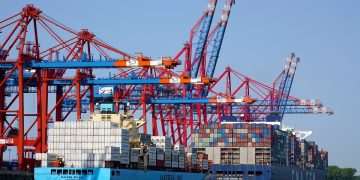The global supply chain has long been the backbone of international trade, enabling the seamless movement of goods across borders. However, recent disruptions—including the COVID-19 pandemic, geopolitical tensions, and rising consumer demand—have exposed deep inefficiencies in supply chains, resulting in bottlenecks, delays, and increased costs. As companies search for solutions to make supply chains more resilient, blockchain technology is emerging as a game-changer. With its ability to offer transparency, traceability, and automation, blockchain is well-positioned to address the challenges of the modern supply chain and drive a new era of efficiency and accountability.
This article explores how blockchain technology is helping solve the global supply chain crisis and what the future holds for supply chain management with blockchain integration.
1. The Current Challenges Facing Global Supply Chains
Supply chains today are more complex than ever, spanning multiple countries and involving a variety of intermediaries, such as suppliers, manufacturers, and logistics providers. This complexity introduces several key challenges:
- Lack of visibility: Companies often struggle to track goods across multiple stages, leading to delays and disruptions.
- Inefficiencies and delays: Manual processes, such as paperwork and approvals, slow down operations.
- Counterfeit goods: The rise of counterfeit products undermines trust and results in significant financial losses.
- Poor communication: Supply chain stakeholders often use siloed systems, which hinders coordination and data sharing.
Blockchain technology addresses these challenges by offering a decentralized, immutable ledger that provides real-time data access to all participants, ensuring transparency and trust throughout the supply chain.
2. What Is Blockchain and How Does It Work in Supply Chains?
Blockchain is a distributed ledger technology that records transactions across multiple nodes in a secure and tamper-proof manner. Each transaction or piece of information is stored in blocks, which are linked together to form a chain. Once a block is added, it cannot be altered, ensuring data integrity.
In a supply chain context, blockchain can store and track information about goods at every stage, from raw materials to the end consumer. This allows all participants—suppliers, manufacturers, logistics providers, and retailers—to access a single source of truth. Blockchain also enables smart contracts, which automate processes by triggering actions (e.g., payment releases) when specific conditions are met.
3. Increasing Transparency and Traceability
One of the most significant advantages of blockchain in supply chains is its ability to provide end-to-end transparency and traceability. With blockchain, each step of the product’s journey can be recorded, making it easy to track where goods are at any given time.
For example, if a food product is contaminated, blockchain can quickly trace it back to the source, pinpointing the exact supplier or batch. This reduces the time required for recalls, minimizes losses, and ensures public safety. Retailers like Walmart are already using blockchain to track fresh produce, ensuring faster traceability in case of quality issues.
In industries like luxury goods and pharmaceuticals, blockchain also helps combat counterfeiting by verifying the authenticity of products. Consumers can scan QR codes on product packaging to view the entire supply chain journey, increasing trust in the brand.
4. Reducing Fraud and Counterfeit Products
Counterfeit goods pose a significant threat to industries such as fashion, pharmaceuticals, and electronics. Fake products not only result in financial losses but also endanger consumer safety—especially in the case of counterfeit medicines.
Blockchain provides a verifiable digital record for every item, making it nearly impossible for counterfeit goods to enter the supply chain undetected. For example, pharmaceutical companies can use blockchain to create a tamper-proof log of drug shipments, ensuring that only genuine products reach the end consumer.
This increased transparency enhances consumer trust, protects brand reputation, and saves companies billions in fraud-related losses.
5. Streamlining Logistics with Smart Contracts
Blockchain technology introduces the use of smart contracts, which are self-executing contracts with the terms directly written into code. These contracts automatically trigger actions—such as releasing payments or updating shipment status—once predefined conditions are met.
In logistics, smart contracts reduce the reliance on intermediaries and manual processes, speeding up operations and minimizing errors. For example, if a shipment arrives at its destination, the smart contract can automatically release payment to the carrier without the need for further verification.
This automation not only saves time and money but also ensures that all parties remain accountable, reducing the likelihood of disputes and delays.
6. Minimizing Supply Chain Delays
Delays in supply chains often arise from inefficient coordination and manual bottlenecks, such as customs clearance, approvals, or misplaced paperwork. Blockchain streamlines these processes by digitizing documentation and creating a shared database accessible to all stakeholders.
With blockchain, documentation such as bills of lading, certificates, and shipping information can be stored digitally, eliminating the need for paper-based processes. This reduces administrative delays and ensures that information flows smoothly across borders. As a result, companies can respond more quickly to disruptions and minimize delays in product delivery.
7. Enhancing Sustainability and Ethical Practices
Consumers today are more concerned than ever about the environmental and social impact of the products they buy. Blockchain helps companies prove their commitment to sustainability by providing verifiable data on the origins and production processes of goods.
For example, clothing brands can use blockchain to ensure that their products are ethically sourced, tracking materials from sustainable farms to the final product. This transparency helps companies meet regulatory requirements and appeal to environmentally conscious consumers.
In addition, blockchain allows companies to measure and track carbon emissions throughout the supply chain, helping them work toward sustainability goals and reduce their environmental footprint.
8. Improving Supplier Relationships
Blockchain strengthens collaboration between suppliers and buyers by creating a shared platform where both parties can access real-time data. This improves communication, reduces misunderstandings, and enables proactive problem-solving.
With blockchain, buyers can track the performance of their suppliers, ensuring on-time delivery and adherence to quality standards. In turn, suppliers benefit from faster payments, as blockchain-based platforms can automatically release payments once goods are delivered, eliminating payment delays.
9. Real-World Examples of Blockchain in Supply Chains
Several companies and industries are already leveraging blockchain to improve supply chain efficiency:
- IBM Food Trust: This platform uses blockchain to provide visibility into the food supply chain, helping companies like Walmart track food products from farm to table.
- Maersk and TradeLens: TradeLens is a blockchain-based platform developed by Maersk to streamline global shipping operations. It reduces paperwork and enhances data sharing between shipping companies, customs authorities, and ports.
- De Beers’ Tracr: De Beers uses blockchain to track the origin of diamonds, ensuring that only conflict-free diamonds enter the market.
These examples demonstrate the transformative potential of blockchain across industries, from food and logistics to luxury goods.
10. Challenges to Blockchain Adoption in Supply Chains
Despite its potential, blockchain adoption in supply chains faces several challenges:
- Scalability: Blockchain networks can become slower as they grow, impacting their efficiency.
- Interoperability: Different supply chains use different systems, making it difficult to integrate blockchain solutions across industries.
- Cost: Implementing blockchain solutions requires significant investment in technology and infrastructure.
- Regulatory uncertainty: Varying regulations across countries can complicate the adoption of blockchain-based solutions.
Overcoming these challenges will require industry collaboration, investment in research, and supportive government policies.
11. The Future of Blockchain in Supply Chains
Blockchain is poised to play an even greater role in supply chain management as the technology matures and becomes more widely adopted. In the future, we can expect:
- Interconnected supply chains: Blockchain platforms will enable seamless data exchange across industries.
- AI and IoT integration: Combining blockchain with artificial intelligence and the Internet of Things will provide even greater automation and insights.
- Tokenized assets: Companies may tokenize goods and services, allowing them to be traded on blockchain-based marketplaces.
These trends will further optimize global supply chains, making them more resilient, transparent, and efficient.
12. Conclusion: Blockchain as the Key to Resilient Supply Chains
Blockchain technology offers a powerful solution to many of the challenges plaguing global supply chains. By providing transparency, traceability, and automation, blockchain ensures that companies can manage disruptions more effectively, reduce fraud, and meet growing consumer demands for sustainability.
As companies continue to explore blockchain-based solutions, supply chains will become more resilient to future crises, paving the way for a new era of efficiency and accountability. The journey may not be without challenges, but the potential rewards—ranging from cost savings to enhanced trust—make blockchain an essential part of the supply chain of the future.
FAQs
1. How does blockchain improve supply chain transparency?
Blockchain provides a shared ledger where all transactions are recorded in real time, making it easy to track goods at every stage.
2. What is the role of smart contracts in supply chains?
Smart contracts automate processes like payments and approvals, reducing the need for intermediaries and speeding up operations.
3. Can blockchain help prevent counterfeit products?
Yes, blockchain creates a tamper-proof record of every product’s journey, making it difficult for counterfeit goods to enter the supply chain.
4. Are there any challenges to blockchain adoption in supply chains?
Challenges include scalability issues, high implementation costs, and the need for interoperability between systems.
5. What industries are currently using blockchain for supply chains?
Industries such as food, pharmaceuticals, shipping, and luxury goods are already leveraging blockchain for improved efficiency and traceability.










































